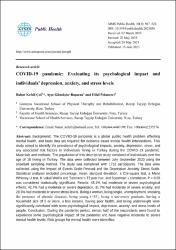| dc.contributor.author | Çol, Bahar Kefeli | |
| dc.contributor.author | Başaran, Ayşe Gümüşler | |
| dc.contributor.author | Pekmezci, Hilal | |
| dc.date.accessioned | 2023-08-14T06:21:46Z | |
| dc.date.available | 2023-08-14T06:21:46Z | |
| dc.date.issued | 2023 | en_US |
| dc.identifier.citation | Çol, B.K., Başaran, A.G. & Pekmezci, H. (2023). COVID-19 pandemic: Evaluating its psychological impact and individuals' depression, anxiety, and stress levels. AIMS Public Health, 10(3), 507-523. http://doi.org/10.3934/publichealth.2023036 | en_US |
| dc.identifier.issn | 2327-8994 | |
| dc.identifier.uri | http://doi.org/10.3934/publichealth.2023036 | |
| dc.identifier.uri | https://hdl.handle.net/11436/7973 | |
| dc.description.abstract | Background: The COVID-19 pandemic is a global public health problem affecting mental health, and basic data are required for evidence-based mental health interventions. This study aimed to identify the prevalence of psychological impacts, anxiety, depression, stress, and any associated risk factors in individuals living in Turkey during the COVID-19 pandemic. Materials and methods: The population of this descriptive study consisted of individuals over the age of 18 living in Turkey. The data were collected between July-September 2020 using the snowball sampling method. The study was completed with 1733 participants. The data were collected using the Impact of Events Scale-Revised and the Depression Anxiety Stress Scale. Statistical analyses included percentage, mean, standard deviation, a Chi-square test, a Mann Whitney U test, Kruskal Wallis and Tamhane's T2 post hoc, and Spearman's correlation. P < 0.05 was considered statistically significant. Results: 45.1% had moderate or severe psychological effects; 42.7% had a moderate or severe depression, 31.7% had moderate or severe anxiety, and 28.5% had moderate or severe stress levels. Being a woman, being single, unemployment, smoking, the presence of chronic diseases, being young (<35), being a university graduate, having a household size of 5 or more, a low income, having poor health, and being underweight were significantly correlated with some psychological impact, depression, anxiety, and stress levels of people. Conclusion: During the pandemic period, almost half of the respondents were found to experience some psychological impact of the pandemic and have negative moderate to severe mental health levels. Risk groups for mental health were identified. | en_US |
| dc.language.iso | eng | en_US |
| dc.publisher | AMER Inst Mathematical Sciences-AIMS | en_US |
| dc.rights | info:eu-repo/semantics/openAccess | en_US |
| dc.subject | Coronavirus | en_US |
| dc.subject | Mental health | en_US |
| dc.subject | Psychological impact | en_US |
| dc.title | COVID-19 pandemic: Evaluating its psychological impact and individuals' depression, anxiety, and stress levels | en_US |
| dc.type | article | en_US |
| dc.contributor.department | RTEÜ, Güneysu Fizik Tedavi ve Rehabilitasyon Yüksekokulu, Fizyoterapi ve Rehabilitasyon Bölümü | en_US |
| dc.contributor.institutionauthor | Çol, Bahar Kefeli | |
| dc.contributor.institutionauthor | Başaran, Ayşe Gümüşler | |
| dc.contributor.institutionauthor | Pekmezci, Hilal | |
| dc.identifier.doi | 10.3934/publichealth.2023036 | en_US |
| dc.identifier.volume | 10 | en_US |
| dc.identifier.issue | 3 | en_US |
| dc.identifier.startpage | 507 | en_US |
| dc.identifier.endpage | 523 | en_US |
| dc.relation.journal | AIMS Public Health | en_US |
| dc.relation.publicationcategory | Makale - Uluslararası Hakemli Dergi - Kurum Öğretim Elemanı | en_US |


















